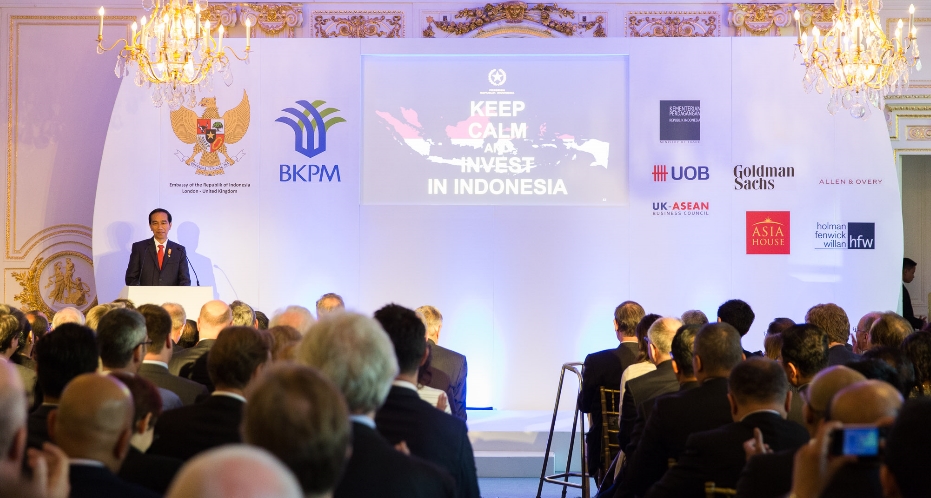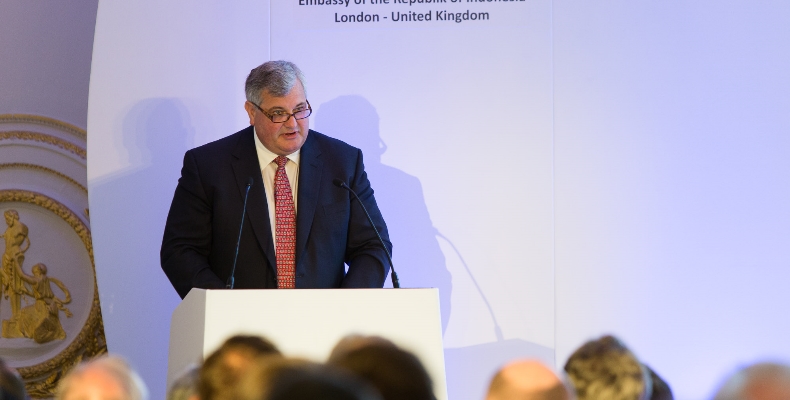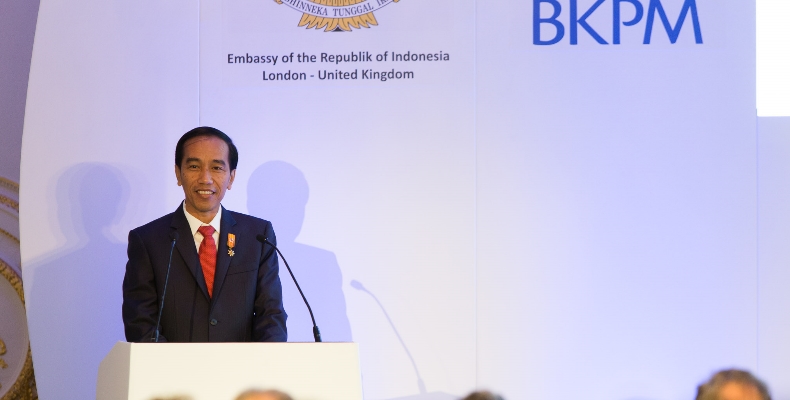Driving commercial and political engagement between Asia, the Middle East and Europe
Driving commercial and political engagement between Asia, the Middle East and Europe
Driving commercial and political engagement between Asia, the Middle East and Europe

The President of Indonesia Joko Widodo (known as Jokowi) has forecast strong economic growth and a stable investment climate and urged British companies to ‘keep calm and invest in Indonesia’ in a keynote speech he made at the UK-Indonesia Business Forum.
“When our GDP numbers came out in January it turned out growth had exceeded our forecast,” President Jokowi said.
“The forecast had been 4.8 per cent year-on-year but we achieved 5.04 per cent year-on-year in the fourth quarter of 2015,” he explained. “In Indonesia we have now achieved a measure of economic stabilisation. Growth may go up or may go down a little but we are estimating approximately five per cent annual GDP growth,” he told the audience of senior business figures, bankers, professionals and diplomats at the conference held Mandarin Oriental Hotel in Knightsbridge, London on Wednesday. It followed a private briefing by Jokowi chaired by Asia House with some of Asia House’s most senior representatives of its corporate members.
“Our economic reforms have made all this possible,” he continued. “We cut fuel subsidies by 80 per cent to free up US$20 billion per year which we are spending on infrastructure, healthcare and education,” he said.
Dressed in a dark suit with a red tie, Mr Widodo was friendly and easy-going as he stepped onto the stage, living up to the ‘man of the people’ image which has been created in the media about him worldwide. The former furniture entrepreneur began his speech by referring to all that he thought was “Great” about Britain – citing its sports, its rock music and its entrepreneurs.
“It’s wonderful to be here today. It’s been many years since I was last in the UK. I like Great Britain. The sport is great,” he said. “The entrepreneurs are great and the music is great,” he said eliciting a warm response from the audience. ” I like the heavy guitar music by Led Zeppelin. I like the song Stairway to Heaven and I like Iron Maiden,” he said, adding he especially liked lead singer Bruce Dickinson. “I still like them all,” he said to loud laughter from the audience.
He then moved onto economics and emphasised how resilient and stable the Indonesian economy had become.

UK Minister of State for Trade and Investment H.E. Mark Ian Price makes opening remarks at the UK-Indonesia Business Forum. Image credit: Chris Renton
He pointed out that in the past year there had been turmoil in global capital markets, China’s stock market had declined significantly, the price of crude oil had plummeted and yet Indonesia’s economy was stable and its stock market had “only gone down a little bit.”
So how has Indonesia achieved this? He explained that the Government had turned the growth engines of the economy around to support the economy and these two engines were investment and infrastructure.
“Eighteen months ago when I took office we launched the largest infrastructure programme in the history of Indonesia,” he said.
He spoke about a US $5.5 billion Chinese-led high-speed railway line in Indonesia scheduled for completion by 2019, which will cut travel time between Jakarta and Bandung by rail to less than 40 minutes from more than three hours. It is one of 20 railway projects being planned. “High speed trains in Indonesia will not only supply Indonesia but export throughout Asia as well,” he said.
He said that investment was also “stabilising and improving” and there was “capital outgrowth from China.” “The 30 per cent devaluation of the rupiah in recent years has made investment in Indonesia attractive,” he said.

Preisdent Jokowi forecasts strong economic growth of 5% in a keynote speech at the UK-Indonesia Business Forum. Image credit: Chris Renton
And he pointed out that China’s economy was moving from a production-based economy to a services-oriented one and from simple manufacturing to higher value manufacturing meaning that many factories were relocating out of China to Southeast Asia. “We will get a sizeable share of that as we are the largest economy in Southeast Asia,” he pointed out.
He reminded the delegates that last year he reshuffled the cabinet to bring in more technocrats and professionals. “In September we launched our reforms campaign and have so far issued 11 economic policy packages,” he said.
The aim of these packages is to create a more business-friendly environment in Indonesia, reduce regulations, promote investment, modernise the economy and make Indonesia globally competitive.
Indonesia has long had a reputation for being closed and protectionist owing to passing a raft of protectionist policies and maintaining trade barriers.
“Openness and competition are the principles of our economic reforms. As supply chains become more global and with developments in technology and social media the choice is only to be open or closed. We must be open,” he said.
“In fact our country is already quite open but the business environment has become quite difficult for domestic businesses and international businesses operating in Indonesia in recent years. That’s why we are deregulating now. Competition creates what business needs,” he added.
Indonesia used to have three airlines, two of which were state-owned. “Prices were expensive and service was bad,” he said.
He said that after the Government had deregulated the sector, the number of airlines shot up and the network expanded. He said that the national airline Garuda Indonesia was now three to four times the size it was a year ago.
He cited another example about how one state-owned oil company – namely Pertamina – used to operate all the petrol stations in Indonesia – which at that time “had a terrible service and a suspicious product.”
The sector was opened up and foreign players such as Shell and Total were allowed in which led to renovation and improvements across the board, he said. “Now Pertamina is bright and shiny, the staff wear clean uniforms and there are minimarts at each station and they take credit cards,” he said.
“I am here to assure you that we will continue to reform and to open our economy,” he told the packed ballroom which had business people standing in the aisles. “Of course we will face social challenges and there may be global economic crises but the solution is keep calm and invest in Indonesia,” he concluded his speech saying, to resounding applause from the audience.
‘Keep calm and carry on’ was a motivational poster produced by the British Government in preparation for WWII. It was rediscovered in 2000 by a British couple and has now been imitated across the world and used on souvenirs, mugs, cards, T-shirts and much more, gaining cult status as a way of symbolising British restraint and stiff upper lip, as well as offering a way of dealing with a crisis.
Jokowi was in the UK as a Guest of Government as part of a European tour. He was accompanied by various ministers and more than 50 Indonesian entrepreneurs. He met UK Prime Minister David Cameron on Tuesday to discuss the strengthening of bilateral relations. The UK-Indonesia Business Forum was supported by Asia House.
naomi.canton@asiahouse.co.uk
Senior figures from some of the world’s biggest corporates joined an Asia House private briefing with the President of Indonesia Joko Widodo before the conference. The briefing was chaired by Asia House Chief Executive Michael Lawrence. To read more about the briefing, find out which top business leaders came and see the photos click here.
